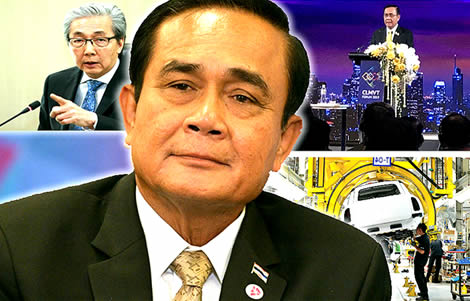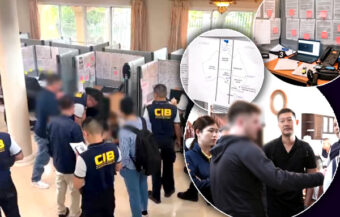The candid analysis by the Thai Prime Minister at a Bangkok seminar on Monday was refreshing. It shows that Thailand is, at least, preparing to take on the challenge as the new government is formed. Thailand also, as a comparatively new industrial economy with a flexible workforce, may be well placed. The Prime Minister called on private firms to embrace the new technological approach to production and supply chains. The Thai government is also urging other Asian and Pacific economies to finalise the Regional Comprehensive Economic Partnership which would represent the biggest free trade are in the world to counter the disruption that in the last 12 months has devastated Thailand’s export trade.
As negotiations on the Asian Pacific free trade area, the Regional Comprehensive Economic Partnership, take place this week in Melbourne, the Thai prime minister opened the week with a frank warning of the threat faced by economies such as Thailand’s from new, technologically advanced world supply chains which will soon threaten Thailand’s traditional industrial base, built up over the last fifty years. It came just after the conclusion of the Asean summit in Bangkok last weekend in which the Thai prime minister passionately defended a multilateral approach to world trade and voiced his concerns about protectionism. This follows shocking data for Thailand’s May exports released last week and a dimming of Thailand’s economic prospects in the last year exacerbated by a highly valued Thai baht. The Thai PM has called on Thailand’s private business sector to embrace the new technological era. Surveys on public opinion this week showed the Thai public to be most fixated on having the Thai Economics Minister, Somkid Jatusripitak, returned to the new cabinet. This is now set to be announced in mid July. It confirms a strong awareness that the economy in Thailand is now the key issue of concern.

At a hotel in Bangkok this week, a day after the Asean summit wound up, the Thai prime minister was frank in his admission that Thailand, as well as its partners in the region, faces a major challenge both from new technological innovation in the manufacturing sphere and the pull of geopolitics. The prime minister declared that 2nd generation economic production in Thailand may be facing decline or even scrappage not from lower priced competitors which is a also a threat, but from new, modern and more advanced supply chains that utilise new technology.
Thailand challenged by geopolitical tensions
The contribution by Thailand’s prime minister, currently in the process of putting together his cabinet, offers another glimpse of the new era that Thailand has entered economically. The prime minister also underlined the challenges being faced by countries like Thailand in the emerging geopolitical tensions between larger economic players including the US, China and The European Union. Often overlooked in the current focus on the US China trade war is the loss of trade in recent months with the European Union.
In the age of Trump’s ‘America First’ policy, Asian countries may have to choose sides
Among the countries participating at the CLMVT forum at the Renaissance Hotel at Ratchaprasong in the centre of Bangkok were representative groups from Thailand’s neighbors Laos, Cambodia, Myanmar and Vietnam. At the end of November 2018, Hun Many, the son of Cambodian strong man and prime minister for the past 35 years Hun Sen, made an interesting observation also while in Bangkok. ‘Perhaps one day Asean would have to choose between US or China,’ he said. As the lights flicker on a possible US China last minute deal or a further escalation of the trade war, it is a question occupying minds. Frankly, many Asian leaders are now, at this point, secretly praying for US President Donald Trump not to be reelected in November 2020. However, the erratic US president’s America First policy may have touched on something of profound significance, the adaptation of new, intuitive technology to old fashioned manufacturing industries long thought to be the preserve of developing economies with low labor costs. This may well be the beginning of the end of that era.
New technology is changing the world’s supply chains and economic system
The vista being explored by the Thai prime minister on Monday is a new one that raises awkward questions to existing economic strategies. The advent of new technology is allowing countries like the United State and its huge corporations to explore new supply chains utilising technology and doing away with the need for a lower cost work force after the costs of transport and foreign activities are taken into account. For now, this is still only an emerging factor as Thailand actually begins so see some gains for the US China trade war. Thailand has, in fact, increased its exports to the United States. But the effects of new advanced technology signals a newly aligned world economy ahead.
Thailand’s existing 2nd generation industry is now vulnerable to technological change
Speaking to the seminar in Bangkok, the Thai Prime Minister highlighted key areas that are now vulnerable to this potential shift. They are the processing industry linked with agriculture, the automobile industry, textiles and electrical products. This is the classic 2nd generation economy which has driven development and prosperity in Thailand for the last fifty years. The decline in May’s export figures for Thailand’s automobile exports of 17% highlights the challenge but also, perhaps, a potential opportunity facing the country.
Philosophy of farming out manufacturing to the East is being reexamined by corporations
Thailand’s much vaunted Thailand 4.0 plan to move Thailand to a high value economy will soon be tested as the new advent of new technology worldwide may have some quite unintended consequences. As Thailand moves to Thailand 4.0, western countries are also retraining middle aged workers who are adapting well to technology. For instance, an EU pilot program has shown recently that redundant middle aged workers in France and other continental European countries can be very successfully retrained. In short, it may spell an end, but over time, to the economic philosophy of global companies farming out production to lower cost economies.
In this way, if countries adapt these technologies and gear up for the new age, the name of the game switches from a multilateral global economy of cooperation to one of innovation and competition between nations to develop the best possible products at the lowest cost. Of course, such competition exists now and cooperation will always feature in worldwide supply chains, but this represents a shift of emphasis. Change is coming.
Thailand may be well placed to adapt to advanced technology due to its flexible workforce
The Prime Minster spoke of the need for businesses in Thailand and other regional countries to begin harnessing to the new technology and implementing it to satisfy the demands of the marketplace. One key advantage that Thailand has, in this race to embrace new technology, is that being a relatively new economy, it has a flexible workforce. Thailand also has a strong private sector including a range of large, family owned enterprises. These are also well placed to benefit from a what is fast approaching, a new era and in business and world commerce.
Thai PM emphasises need for private business to grasp new technology opportunity
The Thai Prime Minister urged the private sector in Thailand and other regional companies to embrace this new era in business. ‘Therefore, the service sector must incorporate cutting edge technologies into their business models. This is especially critical for the main players in the sector such as logistics, retail and wholesale, business services, and financial services,’ he said.
Mid July for new cabinet says PM, economics minister is a top priority for the public
Meanwhile, there is a growing speculation in Thailand not only on the wrangling over cabinet portfolios but now when the new government will be announced by the prime minister. A survey published in Thailand last weekend showed Thailand’s Economics Czar or Economics Minister, Somkid Jatusripitak, was in the minds of over 42% respondents when choosing who should be in the new cabinet lineup. It shows that Thais are looking to the government to tackle the economic situation as a key priority. The Thai Prime Minister indicated this week that his new cabinet will be announced sometime in mid July.
Prayut warns of the damaging effects of protectionism as trade tensions have not eased
At the conclusion of the highly successful Asean summit Bangkok last weekend, the prime minister came out as a strong believer in international cooperation. He called on the leaders present to work to do everything possible to fight the growing trend towards protectionism. ‘The winds of protectionism are hurting our multilateral trading system,’ he said.
Asia Pacific free trade pact is a top priority for Thailand but comes with political implications
The prime minister highlighted the value of the RCEP or Regional Comprehensive Economic Partnership free trade area and vowed to do everything possible to advance the project. ‘It will help offset any impact from the ongoing trade conflict,’ he suggested. Figures suggests that the free trade area, which would be the biggest in the world, would account for nearly 60% of Thailand’s exporters if implemented. It is also expected to account for nearly 40% of the world’s GDP. However, even if this comes about, it will not be without political implications.
Trade pact is seen as a major confirmation of China’s leadership role in the region
The RECP, if concluded, would be seen as a major step forward for China’s role in the Asia Pacific area. Negotiations are currently being held up over a dispute between India and China in relation to market access. India is concerned about the effect of low cost Chinese goods swamping its country and disadvantaging less competitive Indian manufacturers. There is still a long way to go in finalizing the negotiations for the free trade deal with only 7 of 20 chapters concluded. Next year was seen as the year for it to be implemented and intensive negotiations are underway. The Thai government is still hoping to see the deal concluded by the end of the year.
Commerce ministry official upbeat as negotiations take place this week in Melbourne
Negotiations in relation to the RCEP are underway currently in Melbourne Australia. At the Asean summit last weekend, Auramon Supthaweethum of Thailand’s Commerce Ministry was upbeat. ‘At today’s meeting, Asean members reconfirmed their position to push for completion of the RCEP negotiations by the end of this year,’ she said.
Crunch for Thai economy as exports dive. Fears that Thai baht has become a focus of speculation
Thailand faces an economic test as change becomes a reality in cars, farming and business
Thai smartphone users ditching Chinese firm Huawei as US China trade war opens up in tech arena
Economic threats the biggest challenge now for Prayut as he seeks to form new Thai government


















